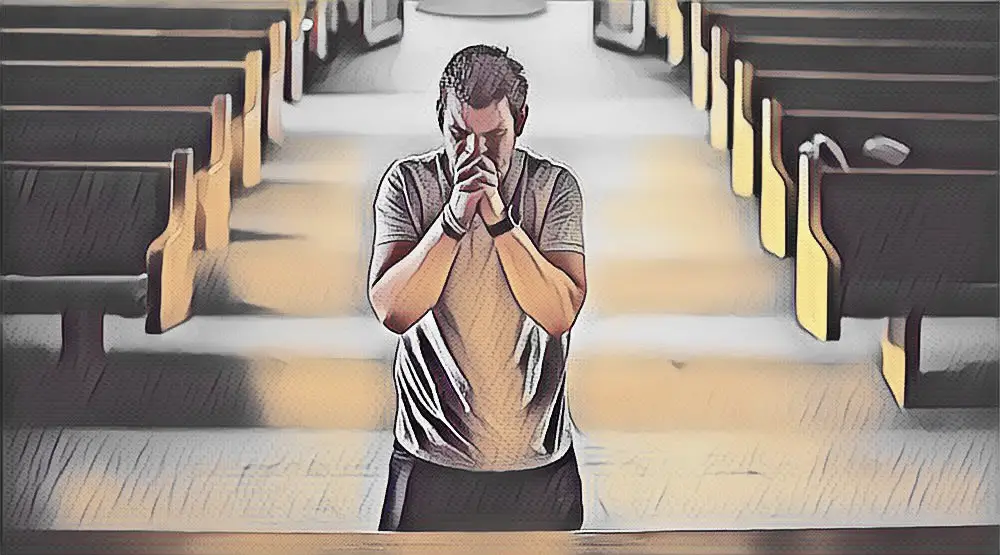I remember the first time I prayed for something really important. I was 19 years old, and my grandmother had just been hospitalized unexpectedly.
My family was filled with worry and uncertainty about her prognosis. That night, I knelt by my bedside and tearfully pleaded with God to heal my grandmother and bring her home safely. I visualized waking up the next morning to good news.
But the days passed without any improvement. Eventually, she passed away in the hospital. I was heartbroken and angry. Why hadn’t God answered my earnest, heartfelt prayer?
It was only later after I got saved and matured in my faith, that I began to understand why some prayers go unanswered.
Certain hindrances can prevent your petitions from reaching God’s ears and being fulfilled. Doubt, unforgiveness, unconfessed sin – these can all obstruct your prayers.
Over time, I learned how to remove these barriers. And I found that cleansing my heart made me more receptive to God’s guidance – and more able to recognize when and how He chooses to answer me according to His higher wisdom and timing.
Now when I pray, I have a sense of holy anticipation rather than frustration when the answers don’t appear immediately. Experience has given me more patience and trust to wait upon the Lord.
If you’re ready to break through the barriers and experience the power of answered prayer keep reading.
Understanding the Hindrances to Answered Prayer

Prayer is a powerful tool that allows you to communicate with God and seek His guidance, support, and intervention in your life.
However, there are times when your prayers seem to go unanswered, leaving you feeling discouraged and wondering why God isn’t listening.
The truth is that some hindrances can block the effectiveness of your prayers.
By understanding these hindrances, you can take steps to address them and remove the barriers that stand between you and the answers to your prayer.
Hindrance 1: Unconfessed Sin

The first hindrance to answered prayer is unconfessed sin. Sin creates a barrier between you and God, hindering your communication and fellowship with Him.
“1 Surely the arm of the Lord is not too short to save, nor his ear too dull to hear. 2 But your iniquities have separated you from your God; your sins have hidden his face from you, so that he will not hear.”
Isaiah 59:1-2 (NIV)
biblegateway.com
When you harbor sin in your heart, it blocks the flow of God’s blessings and prevents your prayers from being answered.
It is important to regularly examine your heart and confess any sins to God, seeking His forgiveness and cleansing.
When you repent and turn away from sin, you open the door for God to work in your life and answer your prayers according to His will.
Hindrance 2: Wrong Motives

Sometimes your prayers go unanswered because your motives are not aligned with God’s purposes.
When your prayers are driven by selfish desires or personal gain, they are unlikely to be answered.
“When you ask, you do not receive, because you ask with wrong motives, that you may spend what you get on your pleasures.”
James 4:3 (NIV)
biblegateway.com
God desires for you to seek His will above your own and pray according to His purposes.
It is important to align your motives with God’s will and seek His guidance in your prayers.
When you pray with pure motives, desiring God’s glory and the advancement of His kingdom, you can be confident that your prayers will be heard and answered.
Hindrance 3: Unforgiveness

Unforgiveness is a hindrance that poisons your prayers and prevents them from being answered.
When you hold onto bitterness, resentment, or a grudge against someone, it creates a barrier between you and God.
Jesus taught us to forgive others as we have been forgiven by God.
By harboring unforgiveness in your heart, you are essentially blocking the forgiveness and blessings that God wants to pour out on you.
“ 25 And whenever you stand praying, if you have anything against anyone, forgive him, that your Father in heaven may also forgive you your trespasses. 26 But if you do not forgive, neither will your Father in heaven forgive your trespasses.”
Mark 11:25-26 (NKJV)
biblegateway.com
To overcome this hindrance forgive those who have hurt you and release them into God’s hands.
When you choose to forgive, you open the door for God’s healing and restoration in your life. Your prayers will begin to flow freely and you will receive your answer.
Hindrance 4: Doubt and Uncertainty

Doubt and uncertainty can hinder your prayers and prevent you from experiencing the power of answered prayer.
When you doubt God’s ability or willingness to answer your prayers, you limit His work in your life.
“6 But when you ask, you must believe and not doubt, because the one who doubts is like a wave of the sea, blown and tossed by the wind. 7 That person should not expect to receive anything from the Lord.”
James 1:6-7 (NIV)
biblegateway.com
Remember that God is faithful and trustworthy. He can do so much more than you can ask or imagine (Ephesians 3:20).
By renewing your mind with God’s promises and choosing to trust in Him, you can overcome doubt and uncertainty and experience the fullness of answered prayer.
Hindrance 5: Unhealthy Relationships

Your relationships can also hinder your prayers. When you are in an unhealthy or toxic relationship, it can drain your energy, distract you from God, and hinder your ability to pray effectively.
“14 Do not be yoked together with unbelievers. For what do righteousness and wickedness have in common? Or what fellowship can light have with darkness? 15 What harmony is there between Christ and Belial? Or what does a believer have in common with an unbeliever?”
2 Corinthians 6:14-15 (NIV)
biblegateway.com
Evaluate your relationships and seek God’s wisdom to determine which relationships are healthy and which ones you need to let go of.
By surrounding yourself with positive influences and cultivating healthy relationships, you create an environment that is conducive to answered prayer.
Hindrance 6: Inconsistent Prayer Life

Inconsistency in your prayer life can hinder your prayers from being answered.
When you only pray sporadically or only when you are in desperate situations, you miss out on the fullness of God’s blessings and provision.
Develop a consistent and disciplined prayer life, making prayer a daily habit not a last resort.
“Constantly rejoicing in hope [because of our confidence in Christ], steadfast and patient in distress, devoted to prayer [continually seeking wisdom, guidance, and strength]”
Romans 12:12 (AMP)
biblegateway.com
By committing to regular prayer and seeking God’s presence in every aspect of your life, you will position yourself to receive the answers and breakthroughs you are seeking.
Hindrance 7: Ignoring God’s will

Finally, ignoring God’s will can hinder your prayers from being answered.
When you pray contrary to God’s will or try to manipulate Him into fulfilling your desires, your prayers will not be answered.
It is essential to seek God’s guidance and align your prayers with His purposes.
By surrendering your will to His and trusting in His perfect plan, you’ll position yourself to receive the blessings and breakthroughs that He has prepared for you.
“14 This is the confidence we have in approaching God: that if we ask anything according to his will, he hears us. 15 And if we know that he hears us—whatever we ask—we know that we have what we asked of him.”
1 John 5:14-15 (NIV)
biblegateway.com
Overcoming Hindrances to Answered Prayer

Now that we have identified the seven hindrances to answered prayer, it’s time to take action and overcome them.
The first step is to recognize and acknowledge any hindrances that may be present in your life. This requires honest soul-searching and a willingness to confront your shortcomings.
Once you have identified the hindrances, you can take steps to address them and remove the barriers that stand between you and answered prayer.
Conclusion
Prayer is a powerful tool that allows you to communicate with God and seek His guidance, support, and intervention in your life.
However, some hindrances can block the effectiveness of your prayers. By understanding and addressing these hindrances, you can remove the barriers that stand between you and God.
Whether it’s unconfessed sin, wrong motives, unforgiveness, doubt, inconsistency, unhealthy relationships, or ignoring God’s will, you have the power to overcome these hindrances and experience all the benefits of answered prayers.
So break through the barriers, develop a vibrant prayer life, and see the transformation that comes when your prayers are answered.
Frequently Asked Questions
Q. What is the significance of prayer in our lives?
A. Prayer is a means of communication with our Heavenly Father, allowing us to express our thoughts, concerns, and requests to Him.
Q. Why is it important to believe that God answers our prayers?
A. Believing that God answers our prayers is essential because it demonstrates our faith in His love, power, and willingness to intervene in our lives.
Q. What role does Scripture play in our prayers?
A. Scripture provides guidance and wisdom for our prayers, teaching us how to approach God, what to ask for, and how to align our desires with His will.
Q. What does it mean to petition in prayer?
Q. Petitioning in prayer means presenting our specific requests and needs to God, asking Him to intervene and provide for us according to His wisdom and love.
Q How can we pray according to God’s will?
Q. We can pray according to God’s will by seeking His guidance through Scripture, aligning our desires with His principles, and surrendering our agenda to Him.
Q. What does the phrase “For the eyes of the Lord are on the righteous” mean concerning prayer?
A. This phrase emphasizes that God attentively watches over and listens to the prayers of those who are in the right relationship with Him.
Q. What did Jesus mean when He said, “If you abide in me, and my words abide in you, ask whatever you wish, and it will be done for you”?
Q. Jesus meant that when we remain in a close relationship with Him, saturating our minds and hearts with His teachings, our desires will align with His will, and He will answer our prayers accordingly.
Q. What should we do when we are unsure if God will answer our prayers?
A. In times of doubt, we should trust in God’s faithfulness and His promises to hear and respond to our prayers. We can continue to pray, seeking His guidance and understanding.
Q. What should we do if God does not answer our prayers the way we want?
A. If God’s answer to our prayers is not what we expected or desired, we should trust in His wisdom and goodness, knowing that He has a greater plan for our lives.
Q. How do we know that God loves us and wants us to pray to Him?
A. We know that God loves us and wants us to pray to Him because He has revealed His love through Jesus Christ and has invited us to approach Him with our needs, desires, and concerns.






